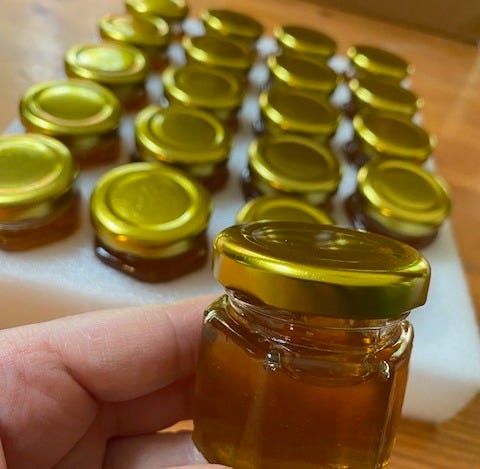Honey as a sleep aid
Less than a year ago, FOOD & FUNCTION published research that shows honey improves sleep patterns without the use of pharmaceuticals.
FOOD & FUNCTION’s September 2024 edition found that honey’s “unique composition” helps improve sleep among individuals with sleep disorders. In a chain of chemical reactions, honey allows the body to produce melatonin, an important hormone for sleep regulation. While sleep might feel restful, the average person burns about 50 calories per hour while sleeping and processes sugars as part of the sleep cycle. Honey can simultaneously improve melatonin production while supplying some digestible sugars before the energy-consumption needs of sleep.
Similar findings surfaced in the AMERICAN ACADEMY OF PEDIATRICS more than a decade ago when researchers studied individuals with sleep challenges due to upper respiratory infections. In their double-blind, randomized, placebo-controlled study, their results showed the group of participants who consumed honey had the greatest sleep improvement out of any other group.
Honey in the big picture of sleep
One of my favorite quotes is from John Muir, “When we try to pick out anything by itself, we find it hitched to everything else in the Universe.” I feel this is a good time to quote Muir because we can’t look at honey, or any food, solely by itself. Individuals with diabetes could have a different reaction to consuming honey before sleep. We also need to consider individuals who have a large meal, high-sugar dessert, or ultra-processed “food” (UPF) before going to bed. (I’ve seen ZOE Science and Nutrition refer to UPF as “edible food-like substances.” That feels like a more appropriate term for conventional packaged “food” sold today.) Digesting a large, processed meal before bed doesn’t create ideal sleeping conditions, and also increases inflammation. It could have a compounding inflammatory effect based on research that shows inadequate sleep also causes inflammation.
Since we can’t look at just one food by itself, we also shouldn’t consider all sleep equivalent. What if an individual doesn’t have access to a quiet space to sleep, or they work nights and are trying to sleep outside of our circadian rhythm? Professor Matthew Walker was recently interviewed on an episode of the ZOE Podcast about “The Secrets of Good Sleep.” Walker shared, “Short sleep or insufficient sleep will change your cardiovascular system for the worse. It will increase your blood pressure … we see significant impacts on your cardiovascular system, and this is the reason why short sleep across the lifespan increases a whole collection of cardiovascular disease features, things such as atherosclerosis. And we published a paper on this recently that having just poor quality sleep and fragmented sleep increases inflammation.”
Aside from long-term inflammation and potential cardiac issues, poor sleep can impact immunity. According to Walker, “If you limit someone to just 4 hours of sleep, for 1 single night, there is a 70% drop in critical anti-cancer fighting immune cells called natural killer cells.” In my earlier post about the nutrient density of sleep, I cited a sleep study of military personnel who were routinely sleep deprived for months. Those individuals experienced immunity issues and were significantly more likely to get a cold or flu.
Set honey up for success
Introducing honey before going to sleep could be part of a larger, health-focused ritual and lifestyle. In a way, setting the honey up for success. Implementing all sleep best practices like avoiding blue light, setting your bedroom to an appropriate temperature, going to bed at the same time each night, and other efforts could be part of a sleep-centered evening ritual that allows honey to be successful in what it has the potential to do for our sleep.
I also shared in an earlier post about the health and sleep benefits of weighted blankets, like pain management, improved mood, and lower use of medications. These blankets might also be part of an overall sleep strategy.
Honey and money: More sleep means better health and more money?
Investing in honey could pay dividends. If honey is part of an overall strategy to improve sleep, it might be a means of increasing lifetime earnings. Williams College released a paper several years ago on “The Wage Returns to Sleep” that showed a correlation with higher wages for folks who got more sleep. According to their studies at the time, about 1 hour of extra sleep per week translated to a 4.9% salary increase. Yet another great reason to support your local beekeeper.






